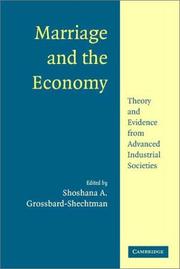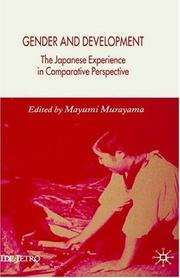| Listing 1 - 5 of 5 |
Sort by
|
Book
ISBN: 9783034300568 3034300565 Year: 2009 Publisher: Bern Lang
Abstract | Keywords | Export | Availability | Bookmark
 Loading...
Loading...Choose an application
- Reference Manager
- EndNote
- RefWorks (Direct export to RefWorks)
What does well-being mean when we talk about men and women in the past? Their sheer chances of survival, their protection from want, their social status, their individual agency and their self-esteem were all strongly mediated by the family, the predominant social institution. Family laws and customs of family formation created differences between insiders and outsiders in terms of well-being. Within families, there were strong differences in autonomy, status and freedom between the genders and generations. The book offers a fascinating exploration of gender differences in well-being in many regions of historic Europe, with some comparative perspectives. It explores how historic family systems differed with respect to choosing a marriage partner, transmitting property, living and care conditions of widows and widowers and the position of children born out of wedlock.
Marriage --- Inheritance and succession --- Domestic relations --- Married women --- Mariage --- Successions et héritages --- Familles --- Femmes mariées --- Economic aspects --- History. --- Social aspects --- Social conditions. --- Aspect économique --- Histoire --- Droit --- Conditions sociales --- History --- Social conditions --- EUR / Europe - Europa --- 331.100 --- 331.20 --- 311.95 --- 172 --- Economische geschiedenis: algemeenheden. --- Sociale geschiedenis: algemeenheden. --- Bevolking naar het geslacht. --- Gezinsmoraal. Huwelijk. Echtscheiding. --- Successions et héritages --- Femmes mariées --- Aspect économique --- Married people --- Women --- Wives --- Married life --- Matrimony --- Nuptiality --- Wedlock --- Love --- Sacraments --- Betrothal --- Courtship --- Families --- Home --- Honeymoons --- Bequests --- Descent and distribution --- Descents --- Hereditary succession --- Intestacy --- Intestate succession --- Law of succession --- Succession, Intestate --- Real property --- Universal succession --- Trusts and trustees --- Family law --- Persons (Law) --- Sex and law --- Social aspects&delete& --- Economic aspects&delete& --- Gezinsmoraal. Huwelijk. Echtscheiding --- Bevolking naar het geslacht --- Economische geschiedenis: algemeenheden --- Sociale geschiedenis: algemeenheden --- Law and legislation --- Marriage - Economic aspects - Europe - History --- Inheritance and succession - Social aspects - Europe - History --- Domestic relations - Europe - History --- Married women - Europe - Social conditions --- Famille --- Aspects économiques --- Europe --- Aspects sociaux

ISBN: 0521891434 1107133785 1280161302 0511120583 0511205929 0511308671 0511615868 0511073380 0511064926 9780511064920 9780511120589 9781280161308 9780511073380 9786610161300 6610161305 0521814545 9780521814546 0521814545 9780521891431 9780511615863 Year: 2003 Publisher: Cambridge Cambridge University Press
Abstract | Keywords | Export | Availability | Bookmark
 Loading...
Loading...Choose an application
- Reference Manager
- EndNote
- RefWorks (Direct export to RefWorks)
Marriage and the Economy explores how marriage influences the monetized economy as well as the household economy. Marriage institutions are to the household economy what business institutions are to the monetized economy, and marital status is clearly related to the household economy. Marriage also influences the economy as conventionally measured via its impact on labor supply, workers' productivity, savings, consumption, and government programs such as welfare programs and social security. The macro-economic analyses presented here are based on the micro-economic foundations of cost/benefit analysis, game theory, and market analysis. Micro-economic analysis of marriage, divorce, and behavior within marriages are investigated by a number of specialists in various areas of economics. Western values and laws have been very successful at transforming the way the world does business, but its success at maintaining individual commitments to family values is less impressive.
Economics --- Families --- Industrialization --- Marriage --- Married people --- Social values --- 172 --- 201 --- 332.71 --- 339.325.1 --- 347.61 --- AA / International- internationaal --- Values --- Married couples --- Married persons --- People, Married --- Persons, Married --- Couples --- Marital status --- Spouses --- Married life --- Matrimony --- Nuptiality --- Wedlock --- Love --- Sacraments --- Betrothal --- Courtship --- Home --- Honeymoons --- Industrial development --- Economic development --- Economic policy --- Deindustrialization --- Family --- Family life --- Family relationships --- Family structure --- Relationships, Family --- Structure, Family --- Social institutions --- Birth order --- Domestic relations --- Households --- Kinship --- Matriarchy --- Parenthood --- Patriarchy --- Economic theory --- Political economy --- Social sciences --- Economic man --- History --- Economic aspects --- Employment --- Gezinsmoraal. Huwelijk. Echtscheiding --- Sociologie: algemeenheden --- Vrouwen- en jongerenarbeid --- Evolutie van de consumptie. Budget van de huishoudens --- Huwelijk. Huwelijkscontract --- Social aspects --- Social conditions --- Business, Economy and Management


ISBN: 1403949441 9781403949448 1349525685 9786610564767 1280564768 0230524028 Year: 2005 Publisher: Hampshire Palgrave Macmillan
Abstract | Keywords | Export | Availability | Bookmark
 Loading...
Loading...Choose an application
- Reference Manager
- EndNote
- RefWorks (Direct export to RefWorks)
Although Japanese economic development is often discussed, less attention is given to social development, and much less to gender related issues. By examining Japanese experiences related to gender, the authors seek insights relevant to the current developing countries. Simultaneously, the book points out the importance for Japanese society to draw lessons from the creativity and activism of women in developing countries.
Women in development --- Women --- Social change --- Social conditions --- Economic conditions --- JP / Japan - Japon --- 332.71 --- 311.95 --- 172 --- 338.022 --- 338.8 --- J4176 --- J4129 --- J4290 --- Vrouwen- en jongerenarbeid. --- Bevolking naar het geslacht. --- Gezinsmoraal. Huwelijk. Echtscheiding. --- Toegevoegde waarde. Theorie van de meerwaarde. --- Economische groei. --- Japan: Sociology and anthropology -- gender roles, women, feminism --- Japan: Sociology and anthropology -- cross-cultural contacts, contrasts and globalization --- World: Sociology, anthropology and culture --- Certainty. --- Social change - Japan. --- Women - Japan - Economic conditions - 20th century. --- Women - Japan - Social conditions - 20th century. --- Women in development - Developing countries. --- Women in development - Japan. --- Women in development. --- Gender Studies & Sexuality --- Gender & Ethnic Studies --- Social Sciences --- Human females --- Wimmin --- Woman --- Womon --- Womyn --- Females --- Human beings --- Femininity --- Development and women --- GAD (Gender and development) --- Gender and development --- WAD (Women and development) --- WID (Women in development) --- Women and development --- Change, Social --- Cultural change --- Cultural transformation --- Societal change --- Socio-cultural change --- Social history --- Social evolution --- Gezinsmoraal. Huwelijk. Echtscheiding --- Bevolking naar het geslacht --- Vrouwen- en jongerenarbeid --- Toegevoegde waarde. Theorie van de meerwaarde --- Economische groei --- Women in development - Japan --- Women - Japan - Social conditions - 20th century --- Women - Japan - Economic conditions - 20th century --- Social change - Japan --- Women in development - Developing countries --- Femmes dans le développement --- Femmes --- Japon --- Conditions sociales --- Conditions économiques
Book
ISBN: 9781847206480 Year: 2008 Publisher: Chichester Elgar
Abstract | Keywords | Export | Availability | Bookmark
 Loading...
Loading...Choose an application
- Reference Manager
- EndNote
- RefWorks (Direct export to RefWorks)
This important book offers valuable insights into the way in which social policies and welfare state arrangements interact with family and gender models. It presents the most up-to-date research in the field, based on a variety of national and comparative sources and using different theoretical and methodological approaches. The authors address different forms of support (care, financial, emotional) and employ a bi-directional perspective, exploring both giving and receiving across generations. They illustrate that understanding how generations interact in families helps to reformulate the way issues of intergenerational equity are discussed when addressing the redistributive impact of the welfare state through pensions and health services.Encompassing a wide number of European countries as well as migrant groups, this book will greatly appeal to graduate students interested in sociology, social policy and social psychology. Researchers and policy makers in the fields of demography and sociology will also find the book an invaluable resource. (Provided by publisher)
Intergenerational relations --- Social policy --- Family policy --- Relations entre générations --- Politique sociale --- Politique familiale --- Age group sociology --- Sociology of the family. Sociology of sexuality --- Europe --- 362 --- 172 --- 339.21 --- 339.321 --- 339.325.1 --- EEC / European Union - EU -Europese Unie - Union Européenne - UE --- #SBIB:316.8H40 --- #SBIB:316.356.2H2220 --- #SBIB:316.356.2H5500 --- National planning --- State planning --- Economic policy --- Social history --- Intergenerational relationships --- Relations, Intergenerational --- Relationships, Intergenerational --- Interpersonal relations --- Families --- Families and state --- State and families --- Public welfare --- Social security --- Gezinsmoraal. Huwelijk. Echtscheiding --- Ongelijkheid en herverdeling van vermogens en inkomens. Inkomensbeleid --- Evenwicht tussen productie en consumptie. Theorie van de koopkracht --- Evolutie van de consumptie. Budget van de huishoudens --- Sociaal beleid: social policy, sociale zekerheid, verzorgingsstaat --- Gezinssociologie: gezinsrelaties: algemeen --- Gezinsbeleid: algemeen --- Government policy
Book
ISBN: 9780415776790 9780415776806 9780203894972 9781135970789 9781135970734 9781135970772 Year: 2011 Publisher: Abingdon Routledge
Abstract | Keywords | Export | Availability | Bookmark
 Loading...
Loading...Choose an application
- Reference Manager
- EndNote
- RefWorks (Direct export to RefWorks)
Sociology of the family. Sociology of sexuality --- International economic relations --- Women --- 172 --- 202 --- 311.95 --- 313 --- 332.71 --- 332.9 --- 342.7 --- 382.11 --- AA / International- internationaal --- Human females --- Wimmin --- Woman --- Womon --- Womyn --- Females --- Human beings --- Femininity --- Economic policy, Foreign --- Economic relations, Foreign --- Economics, International --- Foreign economic policy --- Foreign economic relations --- Interdependence of nations --- International economic policy --- International economics --- New international economic order --- Economic policy --- International relations --- Economic sanctions --- Social conditions --- Gezinsmoraal. Huwelijk. Echtscheiding --- Sociale organisatie --- Bevolking naar het geslacht --- Levenswijze en levensstandaard. Levensminimum. sociale indicatoren (Studiën) --- Vrouwen- en jongerenarbeid --- Internationale organisatie, reglementering en wetgeving van de arbeid --- Grondrechten. Politieke rechten. Rechten van de mens. Grondwettelijke vrijheden. Bescherming van de enkeling --- Theorie van het internationale evenwicht. Economische onafhankelijkheid van een natie. Globalisering. Mondialisering
| Listing 1 - 5 of 5 |
Sort by
|

 Search
Search Feedback
Feedback About UniCat
About UniCat  Help
Help News
News